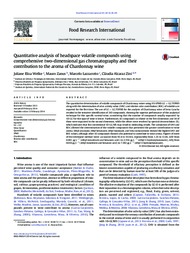Quantitative analysis of headspace volatile compounds using comprehensive two-dimensional gas chromatography and their contribution to the aroma of Chardonnay wine.
Quantitative analysis of headspace volatile compounds using comprehensive two-dimensional gas chromatography and their contribution to the aroma of Chardonnay wine.
Author(s): WELKE, J. E.; ZANUS, M.; LAZZAROTTO, M.; ZINI, C. A.
Summary: The quantitative determination of volatile compounds of Chardonnay wines using HS-SPME-GC × GC/TOFMS along with the determination of odor activity value (OAV) and relative odor contribution (ROC) of volatiles are reported for the first time. The use of GC × GC/TOFMS for the analysis of Chardonnay wine of Serra Gaucha resulted in the tentative identification of 243 compounds, showing the superior performance of this analytical technique for this specific varietal wine, considering that the number of compounds usually separated by 1D-GC for this type of wine is lower. Furthermore, 42 compounds co-eluted in the first dimension and 34 of them were separated in the second dimension, while the others were resolved by spectral deconvolution (8), which indicates that the conventional 1D-GC/MS may result in misleading results. The calculation of OAV and ROC allowed the determination of the volatile compounds that presented the greater contribution to wine aroma. Ethyl octanoate, ethyl hexanoate, ethyl butanoate, and beta-damascenone showed the highest OAV and ROC values, although other 43 compounds showed also potential to contribute to wine aroma. Figures of merit of the developed method were: accuracies from 92.4 to 102.6%, repeatability from 1.2% to 13.4%, LOD from 0.001 ?g L?1 (ethyl isovalerate and hexanoic acid) to 2.554 ?g L?1 (ethyl 3-hydroxybutanoate), LOQ from 0.003 ?g L?1 (ethyl isovalerate and hexanoic acid) to 7.582 ?g L?1 (ethyl 3-hydroxybutanoate).
Publication year: 2014
Types of publication: Journal article
Unit: Embrapa Forestry
Observation
Some of Embrapa's publications are published as ePub files. To read them, use or download one of the following free software options to your computer or mobile device. Android: Google Play Books; IOS: iBooks; Windows and Linux: Calibre.
Access other publications
Access the Agricultural Research Database (BDPA) to consult Embrapa's full library collection and records.
Visit Embrapa Bookstore to purchase books and other publications sold by Embrapa.

